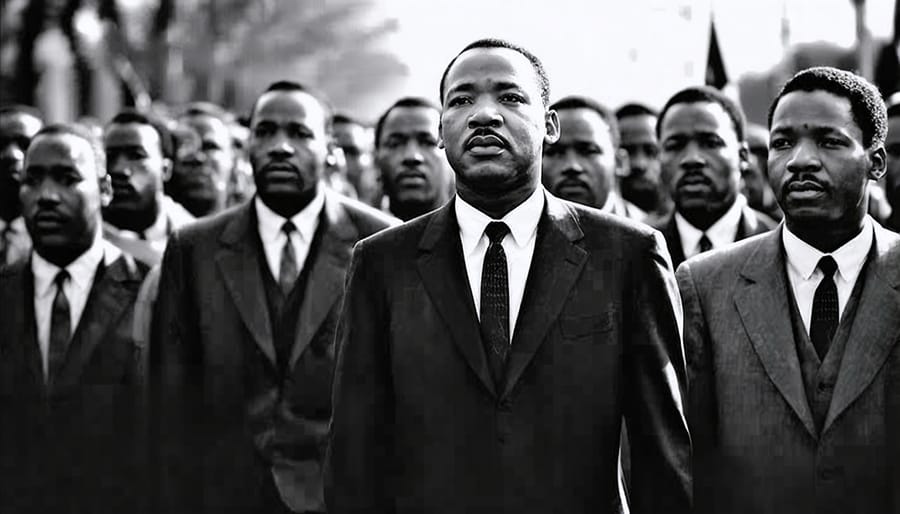Throughout history, faith has been a powerful catalyst for transformative social change, from the abolition movement led by William Wilberforce to Martin Luther King Jr.’s civil rights crusade. As Christians today grapple with complex social issues, the intersection of faith and activism presents both profound opportunities and challenging questions. The Bible calls believers to be “salt and light” (Matthew 5:13-16), actively engaging in society while remaining rooted in biblical truth and Christ-like love. When faith-motivated activism is guided by prayer, grounded in Scripture, and expressed through compassionate action, it becomes a constructive force that not only addresses immediate social needs but also demonstrates God’s love in tangible ways. However, this sacred calling requires wisdom to balance prophetic witness with grace, ensuring our activism reflects the heart of Jesus and truly serves the common good.
The Biblical Foundation for Social Action
Prophetic Calls for Justice
Throughout Scripture, God’s prophets consistently championed justice and social reform, offering us a compelling biblical view on social justice that remains relevant today. Consider Amos, who boldly confronted economic inequality and the exploitation of the poor, declaring God’s desire for justice to “roll down like waters” (Amos 5:24). Isaiah fearlessly advocated for the oppressed, calling believers to “loose the chains of injustice” and “share your food with the hungry” (Isaiah 58:6-7).
Moses himself stood before Pharaoh, demanding freedom for the enslaved Israelites, demonstrating how faith-motivated activism can challenge systemic oppression. The prophet Micah summarized God’s expectations beautifully: “to act justly and to love mercy and to walk humbly with your God” (Micah 6:8).
These prophetic voices remind us that pursuing justice isn’t optional for believers – it’s an essential expression of our faith. Their examples show how speaking truth to power, defending the vulnerable, and working for societal transformation are deeply rooted in God’s heart for His people and His creation.

Jesus’s Model of Compassionate Action
Jesus’s earthly ministry provides the perfect model for faith-motivated activism. Throughout the Gospels, we see Christ consistently addressing both spiritual and practical needs, demonstrating that faith and action are inseparable. He fed the hungry, healed the sick, defended the marginalized, and challenged unjust systems while proclaiming God’s kingdom.
Consider how Jesus approached the woman at the well (John 4), crossing social and cultural boundaries to minister to someone society had rejected. His interaction with tax collectors like Zacchaeus showed how personal transformation could lead to social justice and restitution. When He cleared the temple courts, Jesus demonstrated that faith sometimes requires bold action against exploitative practices.
Christ’s ministry was marked by compassion in action. He didn’t just preach about love – He demonstrated it through tangible deeds. Matthew 9:36 tells us that when Jesus saw the crowds, “He had compassion on them, because they were harassed and helpless.” This compassion always moved Him to action, whether teaching, healing, or meeting physical needs.
His example teaches us that genuine faith naturally flows into active engagement with the world’s needs, motivated by love and guided by divine wisdom.
Modern Examples of Faith-Driven Change

Community Outreach Initiatives
Across the nation, faith-based community initiatives are demonstrating the transformative power of Christian love in action. Local churches are increasingly stepping up to address pressing social needs through innovative programs that bridge the gap between spiritual ministry and practical assistance.
Consider the Hope Kitchen program at First Baptist Church, which not only serves meals to hundreds weekly but also provides job training and mentorship opportunities. Their “Dignity through Work” initiative has helped over fifty individuals transition from homelessness to stable employment in the past year alone.
Grace Community Church’s literacy program pairs retired teachers with struggling students, offering free tutoring while building meaningful relationships across generational and social boundaries. This program has improved reading scores for more than 200 children in their urban neighborhood.
The Lighthouse Project, run by Metropolitan Methodist Church, operates a comprehensive support system for single mothers, providing childcare, counseling, and career development resources. Their Christ-centered approach has empowered dozens of families to achieve financial independence while growing in their faith journey.
These examples illustrate how local congregations are living out Jesus’s teaching from Matthew 25:40: “Truly I tell you, whatever you did for one of the least of these brothers and sisters of mine, you did for me.” Through such programs, churches are demonstrating that faith-motivated activism can create lasting positive change in their communities while sharing God’s love in tangible ways.
Global Faith-Based Movements
Throughout history, faith-motivated movements have demonstrated remarkable power to bring about positive social transformation across the globe. The Civil Rights Movement in America, led by Reverend Dr. Martin Luther King Jr., stands as a testament to how Christian principles of love and nonviolence can reshape society. King’s unwavering faith and biblical understanding of justice inspired millions to peacefully advocate for equality and human dignity.
In South Africa, religious leaders like Archbishop Desmond Tutu played a pivotal role in dismantling apartheid through their faith-based advocacy for reconciliation and human rights. The Truth and Reconciliation Commission, guided by Christian principles of forgiveness and healing, helped the nation navigate a peaceful transition to democracy.
Latin America’s liberation theology movement, while controversial, mobilized countless believers to address poverty and social inequality through the lens of faith. Churches became centers for community development, education, and advocacy for the marginalized, embodying Jesus’s care for the poor and oppressed.
In modern times, faith-based organizations continue to lead transformative initiatives worldwide. From providing humanitarian aid in crisis zones to addressing climate change as stewards of God’s creation, believers are putting their faith into action. The Micah Challenge, inspired by Micah 6:8, unites Christians globally in the fight against poverty, demonstrating how biblical principles can foster international cooperation for the common good.
These examples remind us that when guided by love, wisdom, and biblical truth, faith-motivated activism can be a powerful force for positive change in our world.
Balancing Faith and Action

Prayer and Action
Prayer serves as the foundation and sustaining force of faith-motivated activism. As we engage in social change, maintaining a strong spiritual practice ensures our actions flow from God’s guidance rather than purely human wisdom. Jesus himself modeled this pattern, often withdrawing to pray before significant ministry moments (Luke 5:16).
Regular prayer helps us discern God’s will, maintain pure motives, and receive the strength needed for sustained activism. When we root our advocacy in prayer, we’re less likely to burn out or become discouraged by setbacks. Through prayer, we gain wisdom to navigate complex social issues and maintain a Christ-like spirit even in challenging situations.
Spiritual disciplines like Bible study, meditation, and corporate worship complement our prayer life and keep us centered on God’s purposes. These practices help us resist the temptation to rely solely on human strategies or become overwhelmed by the magnitude of social problems. As the prophet Zechariah reminded us, it’s “not by might, nor by power, but by my Spirit, says the Lord” (Zechariah 4:6).
Remember, meaningful change often begins in the prayer closet before it manifests in public spaces. Let your activism flow from a deep well of spiritual nurture.
Building Bridges
Faith-motivated activism has a unique power to build bridges across diverse communities by focusing on shared values and common goals. When people of faith engage in social action, they often discover that their commitment to justice, compassion, and human dignity resonates with others who may hold different beliefs but share similar humanitarian concerns.
Jesus himself modeled this bridge-building approach, reaching across social and cultural boundaries to connect with Samaritans, tax collectors, and others considered outsiders. Following His example, faith-based initiatives today often bring together unlikely allies united by a common cause, whether it’s addressing poverty, environmental stewardship, or social justice.
These collaborations create powerful opportunities for dialogue and understanding. When Christians work alongside people of different faiths or no faith at all, they demonstrate that love for neighbor transcends religious boundaries. This practical approach to faith in action helps break down stereotypes and builds lasting relationships based on mutual respect and shared accomplishments.
Through these partnerships, faith-motivated activism becomes a testament to the universal values that connect all of humanity, while remaining true to its spiritual foundations. For more insight on fostering interfaith cooperation, explore our resources on building bridges through faith.
Practical Steps for Faith-Motivated Activism
For those seeking to put their faith into action, there are several practical steps you can take to create meaningful change in your community. Begin by prayerfully discerning the specific causes that align with both your faith convictions and personal gifts. As Jesus teaches in Matthew 25:40, “Whatever you did for one of the least of these brothers and sisters of mine, you did for me.”
Start small by identifying local needs in your congregation or neighborhood. This might involve joining existing ministry teams or organizing new initiatives that address specific community challenges. Remember that effective faith-motivated activism begins with building relationships and understanding the needs of those you aim to serve.
Consider these actionable steps:
– Form or join a prayer group focused on social issues
– Volunteer regularly at faith-based organizations
– Partner with other churches or community groups
– Educate yourself about social issues through a biblical lens
– Share resources and opportunities with your congregation
When engaging in activism, maintain a spirit of humility and grace. As Micah 6:8 reminds us, we are called to “act justly, love mercy, and walk humbly with your God.” Focus on sustainable, long-term solutions rather than quick fixes, and always ground your efforts in biblical principles. Reflect on Christian environmental stewardship as one avenue for impactful change.
Document and share your experiences with others, encouraging them to join in the work. Create opportunities for intergenerational involvement, allowing seasoned believers to mentor younger activists while benefiting from fresh perspectives and energy.
Remember that faith-motivated activism isn’t just about external actions – it should flow from a deep relationship with God and be sustained through regular prayer, Bible study, and fellowship with other believers.
Faith-motivated activism continues to be a powerful force for positive change in our world, rooted in biblical principles of justice, compassion, and love for our neighbors. As followers of Christ, we are called to be His hands and feet, working diligently to address social issues while sharing His message of hope and redemption. Through prayer, community engagement, and purposeful action, we can make meaningful contributions to society while staying true to our Christian values.
The examples throughout history and in our present day demonstrate that when faith guides our activism, it leads to sustainable, transformative outcomes that honor God and serve humanity. As Jesus teaches us in Matthew 5:16, “Let your light shine before others, that they may see your good deeds and glorify your Father in heaven.”
We encourage you to prayerfully consider how God is calling you to engage in faith-motivated activism within your community. Whether through local outreach, advocacy, or volunteer work, your faith-inspired actions can create lasting positive change that reflects God’s love and justice in our world.
